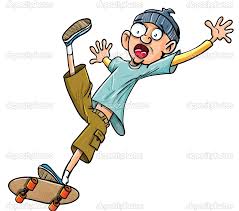 I was recently at a BBQ and tried out a friend’s new skateboard. Being an aging “kid” and keen surfer I “surfed” this skateboard around the garden with modest flair, weaving through garden furniture and verandah poles. A young boy was upset because he could not turn the skateboard that he was on. He asked me to show him how to turn. He showed me what he was doing. He was standing incorrectly with both feet together. I showed him and put him in the correct position and suggested that he practise. One try, did not work for him so he gave up immediately, sat down and cried. I tried to encourage him back but he seemed to be more intent on seeking sympathy than mastering skateboarding. His father said that he always “spits the dummy” when he cannot do something immediately.
I was recently at a BBQ and tried out a friend’s new skateboard. Being an aging “kid” and keen surfer I “surfed” this skateboard around the garden with modest flair, weaving through garden furniture and verandah poles. A young boy was upset because he could not turn the skateboard that he was on. He asked me to show him how to turn. He showed me what he was doing. He was standing incorrectly with both feet together. I showed him and put him in the correct position and suggested that he practise. One try, did not work for him so he gave up immediately, sat down and cried. I tried to encourage him back but he seemed to be more intent on seeking sympathy than mastering skateboarding. His father said that he always “spits the dummy” when he cannot do something immediately.
Our school virtues include PERSISTENCE and RESILIENCE and are crucial habits for children to develop to become successful learners and successful adults. They are defined as:
• The habit of trying again and again without complaint or the need for a reward.
• The habit of accepting failure as the stepping stone to success and bouncing back.
• The habit of seeing problems and difficulties as things you can do something about to make better.
Think of anything that you have learned or mastered. Riding a bike, learning to walk, talk, write, surf, skateboard, fix a car, cook, land a BMX jump… all are learnt through having a go, making mistakes, falling over and getting back up and having another go.
Billie Jean King, a tennis legend, described every lost point as a learning opportunity rather than a loss. All successful learners bounce back and keep trying.
What can we do as parents and educators to help our children learn persistence and resilience? We can redescribe problems as challenges. Give encouragement to try again rather than offer sympathy when a child “trips up” and falls. Help them to see that we learn more from our mistakes than our successes and that failure is a stepping stone to success.
Try asking your child questions such as:
What did you do today that really challenged you?
What mistakes did you make and what did you learn from them?
What did you do that really made you work hard to achieve?
Everyone who is successful has had to practise for thousands of hours. One doesn’t practice what one has already mastered. We practice what we can’t do over and over until we can. Mastery is only achieved through taking one step at a time, picking oneself up after every fall, learning from mistakes and having another go. Developing persistence and resilience will lead to success.
Let’s get our kids back on life’s skateboard every time they fall to help them become persistent and resilient learners.
